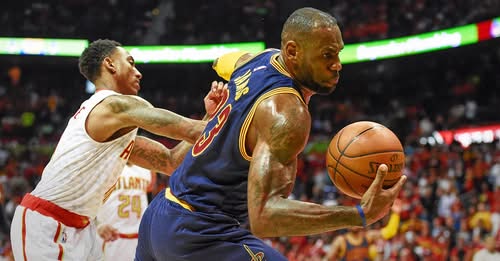Former NBA guard Jeff Teague has never been one to shy away from speaking his mind, and in recent months, he has gained quite a reputation for his candid storytelling and bold takes on NBA legends. His unfiltered style has turned his podcast appearances and social media soundbites into viral moments, with fans and media outlets dissecting his every word. The latest controversy involving Teague revolves around his jaw-dropping comment regarding LeBron James, where he speculated about James’ longevity and physical dominance in a way that some interpreted as suggesting performance-enhancing drugs might be in play. Although Teague later clarified that his comment was not meant to be taken literally, the damage was already done. Fans of LeBron James are famously protective of the four-time NBA champion’s legacy, and the blowback was swift, intense, and even personal. In a recent interview, Teague revealed that he had a heated encounter with an irate LeBron fan, an incident that further illustrates the emotional intensity surrounding debates about James’ place in basketball history.
The controversy began when Teague, during a casual conversation on his popular show “Club 520 Podcast,” discussed the seemingly superhuman longevity of players like LeBron James, who is entering his 22nd season in the NBA and still playing at an elite level. Teague, in typical joking fashion, remarked that “there’s no way you can be that good for that long without something in your water,” a statement that many online users quickly interpreted as a veiled accusation of steroid use. The clip spread like wildfire across social media platforms, with fans either laughing at Teague’s humor or criticizing him for disrespecting one of the greatest players in basketball history. Teague insisted in follow-up comments that it was nothing more than a lighthearted observation, but the internet’s ability to blow things out of proportion took hold, and suddenly he found himself at the center of a storm he never intended to create.
What really pushed things over the edge, however, was the real-world confrontation that followed. Teague recently shared that while he was out in public, a man approached him aggressively, clearly upset about his remarks about LeBron. The fan, who Teague described as “passionate to the point of being scary,” confronted him at a gas station, demanding that he retract his comments and “show some respect for the King.” According to Teague, the situation escalated quickly, with the fan raising his voice and accusing him of trying to tarnish LeBron’s spotless reputation. Teague, who is known for his calm demeanor, admitted that for a brief moment, he thought the encounter might turn physical. He stood his ground, reiterating that his comments were never meant to be malicious but simply playful banter about the nature of sports and athletic excellence.
The episode highlights the often blurred lines between sports commentary and personal attacks in today’s media environment. Teague, like many former players who transition to podcasting or broadcasting, often speaks from a place of authenticity and humor. However, the sensitivity surrounding the legacies of transcendent athletes like LeBron James means that even lighthearted jokes can be misinterpreted. Fans view any suggestion of impropriety as a direct assault on their hero, and in the age of social media, that passion can manifest in extreme ways. Teague’s story about the gas station confrontation underscores how the cultural influence of athletes extends far beyond the court, creating almost tribal levels of loyalty among fans.
Interestingly, Teague’s comments, while controversial, have also sparked an important conversation about athlete longevity and how the human body can withstand the demands of elite sports for decades. LeBron James is 40 years old and continues to perform at a level comparable to players nearly half his age. His dedication to training, recovery, and nutrition is well-documented, with reports suggesting he spends over a million dollars annually on body maintenance and health optimization. Teague himself acknowledged this during the fallout, praising LeBron’s relentless work ethic and saying that his comments were never meant to diminish the greatness of the Lakers superstar. Instead, Teague argued that his remarks were meant to highlight how unprecedented and almost superhuman LeBron’s career has been, especially in a sport as physically demanding as the NBA.
The media frenzy around Teague’s comment also reflects the evolving role of former athletes in shaping public discourse. Unlike traditional broadcasters who often choose their words carefully to avoid controversy, Teague belongs to a new generation of former players who embrace authenticity and relatability, even if it means stepping into hot water. His podcast has become popular precisely because fans feel like they are getting an unfiltered look into the locker room culture and behind-the-scenes dynamics of professional basketball. However, as Teague’s experience shows, this style of commentary can sometimes backfire, especially when discussing players who have built iconic legacies. LeBron James is not just a basketball player; he is a global brand, a cultural icon, and a figure who inspires millions. Any insinuation that his accomplishments are anything less than the product of hard work and dedication is bound to provoke a strong response.
Teague’s encounter with the angry fan is also emblematic of a larger trend in sports fandom where players and commentators are increasingly accessible in public spaces. In the past, heated debates about sports stayed confined to barbershops, sports bars, and living rooms. Today, thanks to social media and the constant cycle of content, these debates spill into everyday life, and fans feel emboldened to confront players and commentators directly. Teague admitted that the confrontation rattled him, not because he feared for his safety but because it showed just how intense people’s emotions can be when it comes to defending their favorite athletes. He quipped that he never expected a joke made during a podcast recording session to lead to a near-altercation at a gas station.
For LeBron James, this incident is just another testament to the power of his legacy. Few athletes inspire this level of devotion and loyalty from their fans. Whether it is his achievements on the court, his philanthropic efforts, or his role as a voice for social issues, LeBron commands a unique space in the sports world. Teague’s story, while humorous in hindsight, underscores how protective fans are of that legacy. It also raises questions about the responsibility of former players when they discuss their peers or those who came after them. While Teague likely meant no harm, the weight of his words carries extra significance because of his status as someone who shared the NBA floor with LeBron. When a former player makes a provocative comment, fans often interpret it as insider knowledge, even if the remark was meant in jest.
Despite the controversy, Teague has maintained his sense of humor about the entire ordeal. He joked that he might need to start hiring security if LeBron’s fanbase continues to take his comments so personally. He also noted that he has received a surprising amount of support from other fans who appreciate his willingness to speak freely, even if it sometimes leads to uncomfortable moments. This duality—being both criticized and praised—reflects the current state of sports media, where honesty and entertainment often clash with the need to protect the reputations of beloved athletes.
Ultimately, the situation between Jeff Teague and the passionate LeBron fan is a reminder of how deeply intertwined sports, culture, and personal identity have become. Fans see their favorite players not just as athletes but as symbols of perseverance, greatness, and excellence. Any perceived attack on those symbols is taken personally. Teague’s experience shows that while players-turned-commentators have a unique perspective, they must also navigate the minefield of modern fandom, where even a passing remark can ignite a firestorm.
In reflecting on the incident, Teague has expressed admiration for LeBron James, emphasizing that he respects everything James has accomplished and that his controversial comment was rooted in amazement, not criticism. He has also hinted that the confrontation with the fan will likely become another story he shares on his podcast, turning an uncomfortable moment into yet another entertaining anecdote for his audience. Whether this saga fades quickly or lingers as part of Teague’s growing reputation for stirring the pot, one thing is certain: his encounter highlights the power of words, the passion of fans, and the unshakable legacy of a player like LeBron James, whose influence extends far beyond the basketball court.



